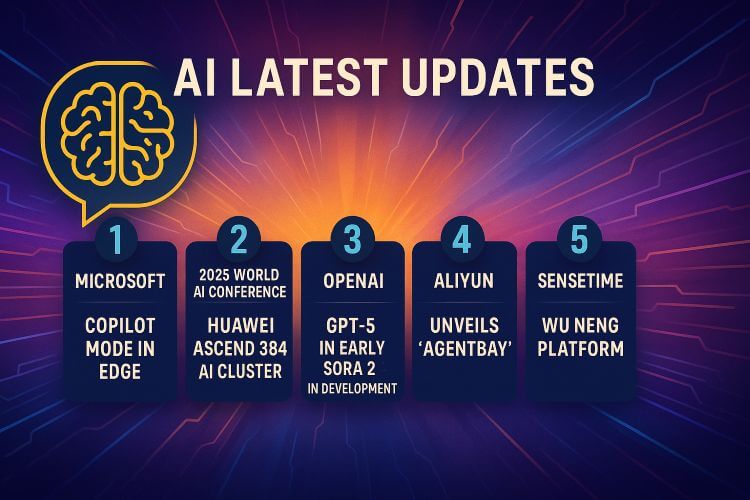AI Navigation
- articleAI Trends
- lightbulb_2AI Tips
- assistant_navigationAI Navigation
- heatHot Articles
- emergency_heat_2Hot Tips
AI Tech News Roundup for July 28, 2025: Latest Updates from Microsoft, Huawei, OpenAI, Alibaba Cloud, and SenseTime
On July 28, 2025, the global artificial intelligence industry saw a wave of major announcements. Over the past 24 hours, leading companies such as Microsoft, Huawei, OpenAI, Alibaba Cloud, and SenseTime unveiled significant developments, signaling that AI technology is entering a new phase of competition. From browser assistants to cloud-based AI “brains,” from embodied intelligence to generative video, the boundaries of AI continue to expand, reshaping the future of business and technology. Here’s a deep dive into the five key AI news items of the day:

1. Microsoft Copilot Arrives on Edge Browser
Microsoft announced on its official website that the Edge browser is now equipped with the new Copilot mode. This isn’t just a feature update—it’s a strategic move in AI search and assistant integration. With Copilot, users can pose any question, and the browser will automatically search, aggregate data from multiple sources, and deliver highly consolidated, comparative results.
What’s noteworthy is the introduction of tag filtering and intent recognition, enabling AI to better understand the user’s true needs and provide more precise answers. This upgrade turns the browser from a “search tool” into an “intelligent problem-solving assistant.” In contrast, Google has already integrated its Gemini assistant into Chrome, but Microsoft’s rollout of Edge Copilot is broader and more aggressive, intensifying the competition in AI-powered browsing.
2. Huawei Showcases Ascend 384 Supernode at WAIC
At the 2025 World Artificial Intelligence Conference (WAIC), Huawei unveiled its Ascend 384 Supernode for the first time. This cutting-edge AI computing platform is seen as a direct challenger to NVIDIA’s most powerful systems.
The Ascend 384 stands out with its modular design and high energy efficiency, significantly reducing costs in fields like scientific research, autonomous driving, cloud computing, and large-scale model training. Top Chinese tech firms including Baidu, Meituan, and ByteDance have already deployed the system. Analysts suggest the Ascend 384 may lessen China’s reliance on NVIDIA GPUs and could reshape the global AI computing landscape over the next one to two years.
3. OpenAI to Launch GPT‑5 and Develop Sora2
OpenAI revealed that its next flagship model, GPT‑5, will launch in early August 2025. The model is expected to deliver “transformational” upgrades, with major improvements in reasoning, long-text processing, and cross-modal interaction.
At the same time, OpenAI is developing Sora2, a next-generation generative video AI model that builds on the original Sora. It promises improved resolution, finer detail control, and more coherent storytelling. Additionally, the ChatGPT Agent feature has been rolled out to Plus, Pro, and Team users, meaning users can now delegate complex tasks like booking tickets, writing scripts, and managing files—marking OpenAI’s evolution from a “chat model” to a “true digital assistant.”
4. Alibaba Cloud Launches Wuying AgentBay, a Cloud-Based ‘Super Brain’
On July 28, Alibaba Cloud officially introduced Wuying AgentBay, the world’s first cloud computer built specifically for AI Agents. This “super brain” can handle code execution, web browsing, data analysis, software development, and spreadsheet creation, while also offering capabilities like visual understanding, natural language control, and task parsing.
The highlight of AgentBay is its cross-platform compatibility and ultra-simple integration. It can switch seamlessly among Windows, Linux, and Android systems, and developers can access cloud computing power and toolchains with just three lines of code. This lowers the barrier to building and deploying AI Agents, making AI functions as easy to use as plug-and-play cloud services—an innovation set to impact enterprise automation, industry solutions, and smart application ecosystems.
5. SenseTime Unveils the “Wuneng” Embodied Intelligence Platform
SenseTime launched its Wuneng Embodied Intelligence Platform, a major new step following its “Kaiwu” world model. By combining its world model with powerful computing infrastructure, Wuneng allows robots and smart devices to gain perception, visual navigation, and multimodal interaction abilities.
The platform isn’t limited to service robots and warehouse logistics—it also supports autonomous driving and smart manufacturing. Industry experts believe embodied intelligence is the next major turning point in AI. With the release of Wuneng, SenseTime may help position Chinese AI firms at the forefront of the “AI + robotics” field, driving breakthroughs from software to hardware.
Summary and Industry Outlook
The AI news from July 28 paints a clear picture: AI is rapidly permeating browsers, computing infrastructure, cloud systems, and embodied intelligence platforms. Giants like Microsoft and Google are accelerating the race for AI assistants, Huawei and NVIDIA are intensifying the battle for computing dominance, while OpenAI, Alibaba Cloud, and SenseTime are pushing frontiers in general models, AI Agents, and embodied AI.
In the coming months, generative AI, cloud intelligence, and AI-powered robotics are expected to converge, sparking the next wave of technological revolution and industrial transformation. Whether you’re a business, developer, or everyday user, the AI wave will bring unprecedented change and opportunity.
For more AI updates, in-depth analysis, and trend insights, stay tuned to iaiseek.com to keep your finger on the pulse of global artificial intelligence.